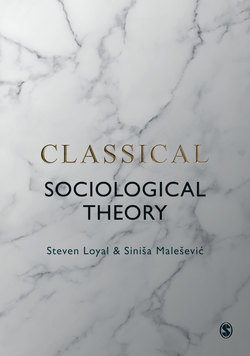Читать книгу Classical Sociological Theory - Sinisa Malesevic - Страница 26
На сайте Литреса книга снята с продажи.
The Nicomachean Ethics
ОглавлениеAristotle conceives ethics as part of what he calls the ‘practical sciences’ – which also include politics. These are separated from the theoretical and productive sciences in terms of their ends and objects. His aim in the Nicomachean Ethics is not to teach for the sake of knowing, which is the aim of the theoretical sciences, but a practical aim, so that men can lead good, happy, lives. It is to tell people how to act in the world, akin to providing a skill as in artistic production. The methodology and approach used in the practical arts must be also commensurate with the subject matter being dealt with. Here scientific precision and exact knowledge are, for Aristotle, impossible since ‘noble and just actions’ exhibit ‘much variety and fluctuation’ so that one can only ‘speak about things which “are only for the most part true” that is roughly and in outline’ (Aristotle, 2014: 1094b).
It was noted earlier how the principle of self-sufficiency was a central value in Greece. Drawing on his principle of hierarchy, Aristotle argues that the highest good must be wanted for itself, and not as a means to something else; it must be self-sufficient, and lack nothing. Although all actions aim at some purpose or good, some goods or ends are means for seeking higher goods or ends, of which one is the final chief good, ‘that for whose sake of everything else is done’ (Aristotle, 2014: 1097b).
It is, he argues, generally agreed by both ‘the general run of men and people of superior refinement’, including Plato, that the ultimate goal of all our actions is happiness so that people identify ‘living well and faring well with being happy’ (Aristotle, 2014: 1095a19). In Greek the term eudaimonia has a much broader objective connotation than the modern subjective notion of happiness, and can also be translated as flourishing, blessedness, living well (eu zên) or fulfilment, which imply behaving well and faring well in terms of physical, material and psychological well-being. Happiness is the supreme good because it is chosen for its own sake and not for the sake of something else, and all other goods are chosen to achieve it. It is in other words a first principle, for it is for the sake of happiness that we do everything else.
Humans need to fulfil their ‘rational element’ to its maximum ‘since man is born for citizenship, he is a politikon zoon (political animal)’ (Aristotle, 2014: 1097b). Here Aristotle introduces a crucial sociological concept: of humans as fundamentally social and political beings. The terms ‘born for citizenship’ can also be translated as ‘is a political animal’ and the term ‘political’ also encapsulates what in modern societies we would refer to as ‘social’. Humans also possess the capacity for language, which allows them to communicate and reflect on what is just and unjust.
The importance of happiness and virtue does not reside in the state of mind of the individual, but in his or her activity or practice, since virtue in the mind can produce no ‘good result’; it is akin to a man being asleep or inactive. It is only by doing just acts that someone can become just, and temperate acts become temperate. For Aristotle the life of those who lead a virtuous life will also be a pleasant life since pleasure is a state of the soul.
Aristotle, while acknowledging happiness as ‘ a virtuous activity of soul, of a certain kind’ (2014: 1099b), does, however, presuppose the existence of a certain amount of sufficient resources which he refers to as ‘proper equipment’ or ‘external goods’ – instruments for carrying out noble actions. These include material goods and wealth, power and friendship. Moreover, the absence of certain things or qualities diminishes one’s happiness; this includes good birth, goodly children and beauty. Happiness, though it requires a degree of ‘study and care’, also requires an element of chance and good fortune in life.
According to Aristotle, individuals need to act ‘in accordance with correct reason’, more specifically, than they do so by choosing to act in accordance with a mean, rather than incorrect or inappropriate feelings. The ‘mean’ refers to a rule or principle of choosing actions appropriately in different situations based on a criterion that avoids two opposite extremes: one of deficiency and the other of excess. For example, courage constitutes the virtuous mean between cowardice and rashness. This emotionally laden social skill of acting according to the mean, that is the ability to do the right or the appropriate thing in each different circumstance, is generally acquired through habit, upbringing and practice rather than learned through explicit teaching. Having devoted a large part of the book to discussing the importance of moral virtues and the importance of practical wisdom in realising these, Aristotle concludes, perhaps as a result of countervailing political reasons, by arguing that the happiest life is not one centred on an ethical life of practice and activity, as found in democracy, but on a life devoted to contemplation and study (theorie). It is in fact the life of a philosopher.
